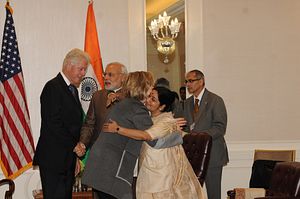Before becoming prime minister, India’s Narendra Modi was barred from receiving a visa to visit the U.S. A rising leader in the Hindu nationalist Bharatiya Janata Party (BJP), he was tied to deadly sectarian violence. But now he leads one of Asia’s most important powers and the Obama administration is rolling out the red carpet.
India long was ruled by the dynastic Indian National Congress Party, which enshrined dirigiste economics as the state’s secular religion. As a result, a land which spawned a global network of entrepreneurs and traders remained desperately poor.
Eventually, however, reality seeped into New Delhi. The Congress Party liberalized the economy. The BJP broke the Congress monopoly on power.
New Delhi appeared ready to follow the People’s Republic of China to international superstar status. But then enthusiasm for economic reform ebbed, economic growth slowed, and conflict with Pakistan flared.
However, on May 26 Narendra Modi became prime minister. He is visiting the U.S. to speak before the United Nations and meet with President Barack Obama. The trip could yield rich benefits for both countries.
Of course, there was that embarrassing visa ban, the only one ever issued for that reason by Washington. The matter was quietly forgotten, though the underlying issue never was resolved.
While serving as the chief minister of the state of Gujarat in 2002, Modi was implicated in Hindu riots which killed over 1,200 people, mostly Muslims. It was generally agreed that some in his government were complicit in the violence. However, Modi escaped responsibility—some proclaimed him innocent, others contended that evidence had been destroyed.
Modi so far has focused on India’s future. He was elected to reform the sputtering economy, which would not be helped by fueling religious hatred. To date his administration appears to be pragmatic and practical.
The prime minister’s visit to America offers an opportunity for a reset in bilateral relations. The Bush administration made a major push to improve ties by accepting New Delhi’s development of nuclear weapons, but little progress has occurred during the current administration. Indeed, controversies over trade policy and criminal charges against an Indian diplomat put the two governments at sharp odds.
The result is a lost opportunity for both nations. India, which, based on purchasing power parity, trails only America and China economically, so far performs far below its potential.
Modi naturally hopes to expand his nation’s commercial ties throughout Asia, which increasingly is the world’s economic center of gravity. But America remains the most important single state—with the largest (depending on measure), most sophisticated, and wealthiest economy.
Geopolitically, India has yet to play the international game as well as possible, though the new prime minister has embarked upon an ambitious travel schedule abroad. New Delhi’s most persistent foreign antagonist is Pakistan. Building closer and more enduring ties with America would help India wean Washington away from its tight Pakistani embrace.
More important in the long-term is New Delhi’s desire to develop international counterweights to China even while cooperating economically. Beijing remains well ahead of Delhi in most military and economic measures of power. However, Modi recently visited Tokyo, strengthening ties with another wealthy industrialized state as well as emerging counterweight to the PRC.
The greatest prize for New Delhi would be the U.S. The prime minister recently cited the improvement in bilateral relations and explained: “Our ties have deepened. India and the United States of America are bound together, by history and by culture. These ties will deepen further.”
Washington is thinking in similar terms. When Secretary of State John Kerry visited New Delhi in July, he said he wanted the two nations to become “indispensable partners.”
No one expects a formal military alliance, which would be in neither nation’s interest. And important issues will continue to divide the two capitals. But friendlier political relations, increased security cooperation, and enhanced trade and investment would remind the PRC that its growing power is matched by that of its wary neighbors.
India has further to travel than China to geopolitical greatness, but still matters today. New Delhi will matter much more tomorrow, especially if Prime Minister Modi commits his political capital to eliminate barriers to entrepreneurship, investment, and growth. Moreover, democracy gives the Indian people the ability to shape their own destiny.
The 21st century will be the Asian century, with a major assist from the United States. Most analysts presume Chinese dominance, but India could prove them wrong. If Barack Obama and Narendra Modi make a serious effort to overcome past differences, their governments could find themselves, like Rick and Captain Renault in the movie Casablanca, at the “beginning of a beautiful friendship.”
Doug Bandow is the Senior Fellow and former Special Assistant to President Ronald Reagan. He is the author of Foreign Follies: America’s New Global Empire (Xulon Press).
































